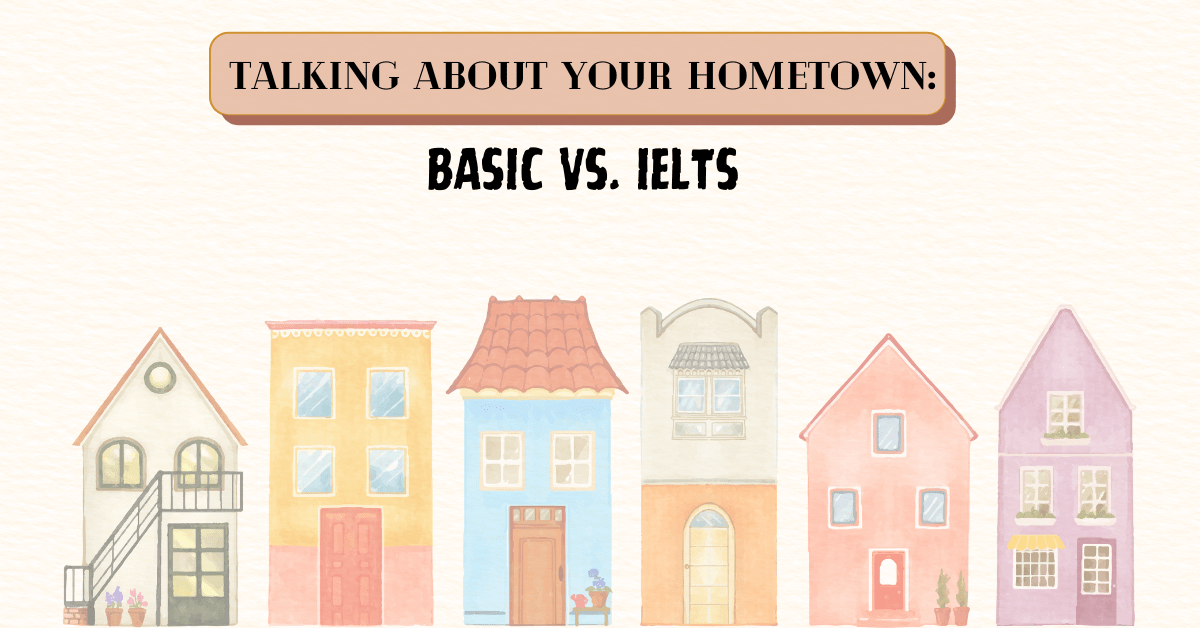Talking about your hometown can be surprisingly engaging if you approach it the right way. Depending on the situation, the depth and style of your response might differ. Casual conversations typically require a simple and relatable explanation, while formal situations like the IELTS speaking test demand structured, descriptive, and fluent responses. Let’s break it down and explore how you can confidently discuss your hometown in any scenario—and how the FixoLang app can help you practice effectively. This comparison of basic vs IELTS responses will highlight the differences and guide you.
What Does Your Hometown Mean to You?
The Basics
- Casual Chats: For everyday conversations, your hometown is simply the place where you grew up or currently live. A quick mention of its name and a standout feature is usually enough.
- IELTS Responses: Here, your hometown becomes a canvas to showcase your vocabulary, fluency, and ability to organize ideas. A well-rounded response might touch on its geography, culture, history, and your personal connection. This contrast between basic vs IELTS approaches is essential for tailoring your response.
Example:
- Basic: “I’m from Austin, Texas. It’s a lively city with great music and food.”
- IELTS: “My hometown is Austin, Texas, often called the ‘Live Music Capital of the World.’ It’s a vibrant city located in central Texas, known for its diverse music scene, amazing barbecue, and a friendly, laid-back vibe.”
Casual Conversations About Your Hometown
Keep It Simple and Relatable
- Name and Location: Share the basics: “I’m from Sydney, Australia.”
- Highlight One or Two Key Features: Mention a unique aspect: “We have beautiful beaches like Bondi and Manly.”
- Be Friendly: Use a relaxed tone: “It’s sunny most of the year, which is perfect for outdoor fun.”
Connect Through Shared Interests
Talking about the weather, food, or famous spots often strikes a chord in casual conversations. Understanding the difference in detail for basic vs IELTS responses helps you adjust naturally.
How to Talk About Your Hometown in IELTS
Tips for a High-Scoring Answer
- Use Descriptive Vocabulary: Paint a vivid picture using words like “bustling,” “picturesque,” or “historic.”
- Organize Your Ideas: Start with an introduction, elaborate on unique features, and wrap up with a personal reflection.
- Practice Coherence and Fluency: Stay on topic and maintain a steady flow of ideas.
Example Structure:
1. Introduction:
“My hometown is Jaipur, the capital city of Rajasthan in India.”
2. Unique Features:
“It’s famous for its historic architecture, such as the Hawa Mahal and Amber Fort, which attract tourists from around the globe.”
3. Personal Connection:
“I’ve lived there my whole life, and I especially love the vibrant festivals like Diwali and Holi that bring the city to life.”
4. Closing Statement:
“Overall, Jaipur is a city that beautifully blends tradition and modernity.”
Basic vs. IELTS: Key Differences
When comparing basic vs IELTS responses, the difference lies in the level of detail and vocabulary. For casual settings, keep it light and straightforward. For IELTS, focus on rich descriptions, organized ideas, and advanced language use.
How FixoLang Helps You Master Hometown Conversations
FixoLang is a language learning app designed to boost your confidence in speaking about topics like your hometown. Here’s how it helps:
- Practice Mock Conversations: Engage in AI-driven scenarios, such as casual chats or IELTS speaking tasks, to refine your responses.
- Improve Vocabulary: Access tailored word banks with descriptive terms like “tranquil,” “cosmopolitan,” and “steeped in history.”
- Receive Feedback: Get instant corrections on grammar, pronunciation, and structure.
- Track Progress: Monitor improvements through regular practice and personalized insights.
With FixoLang, you can polish your answers and become fluent in describing your hometown confidently, whether you’re chatting with a friend or acing an IELTS test. It’s especially useful for mastering the nuances between basic vs. IELTS speaking styles.
Common Challenges and How to Overcome Them
For Casual Conversations:
- Challenge: Not knowing what to say.
- Solution: Start with simple facts and add one unique detail, like a local attraction or event.
For IELTS Responses:
- Challenge: Running out of ideas.
- Solution: Use FixoLang’s prompts to practice organizing your thoughts on aspects like culture, food, or festivals.
Enhancing Your Hometown Description
Advanced Vocabulary for IELTS:
- Adjectives: Picturesque, bustling, tranquil, historic, cosmopolitan.
- Phrases: “Renowned for,” “Steeped in history,” “A melting pot of cultures.”
Practice Makes Perfect
- Record yourself speaking about your hometown and identify areas for improvement.
- Use FixoLang’s mock tests to simulate real-life situations and refine your speaking skills.
Conclusion
Whether it’s a quick chat or a formal test, talking about your hometown can be an enjoyable way to connect and showcase your language skills. In casual settings, keep it simple and relatable. For IELTS, focus on structure, detail, and vocabulary. And for the best results, let FixoLang guide your practice with its interactive tools and resources. With consistent effort and the right tools, you’ll speak about your hometown with ease and confidence. Understanding the basic vs. IELTS differences is key to adapting your response for any situation.


